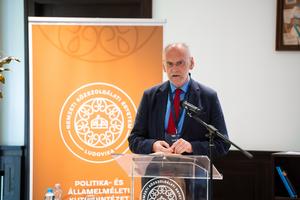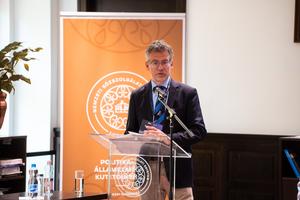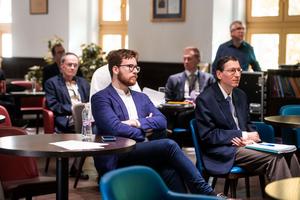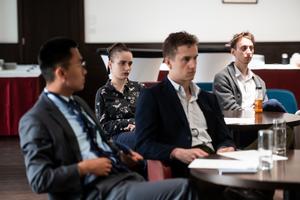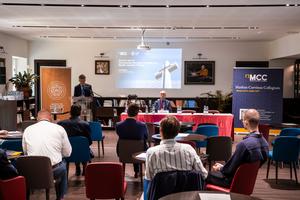The Research Institute for Politics and Government, in collaboration with the MCC MCC Center for Constitutional Politics and the Danube Institute, organized a conference on Christian realism, a variant of political realism. This political theory remains influential in America, particularly due to the works of Protestant theologians, with Reinhold Niebuhr (1892–1971) often cited as its founding father.
The conference, therefore, predominantly featured American researchers, with Niebuhr’s name frequently mentioned. The keynote lectures were delivered by two prominent figures: Robin Lovin, the most influential senior researcher of the movement, and Nigel Biggar, an Oxford Anglican theologian and member of the British House of Lords, whose work spans contemporary moral theology, natural law, human rights, and the doctrine of just war. These topics are closely or indirectly tied to Protestant political realism, understood as political theology.
All invited speakers were selected from among those who made significant contributions to the field, many through published books, ensuring that the participants represented the forefront of Christian realism research. For instance, Eric D. Patterson and Robert J. Joustra brought with them their recently published anthology, Power Politics and Moral Order: Three Generations of Christian Realism—A Reader (2022). Matt Andersen is set to defend his doctoral dissertation on the topic at Oxford University. Dallas J. Gingles and Joshua Mauldin published a volume in 2023 titled The Future of Christian Realism: International Conflict, Political Decay, and the Crisis of Democracy (Lexington, 2023).
On the host side, Ferenc Hörcher provided a modern intellectual history outline of the Catholic parallel to the movement. Ádám Darabos, who recently defended his doctoral dissertation on Niebuhr, surprised the research community with a novel periodization of the theologian’s life in his presentation. Hungarian contributors also included Tamás Nyirkos, a researcher at the Institute, and Gergely Szilvay, a journalist.
A clear picture of Christian realism can be drawn from the 8+1-point summary provided by Lord Biggar in his closing remarks:
• Christian realism opposes dangerous moral idealism, as seen in the 1930s and 2010s.
• It views power as neutral, sometimes used for ill, but which should be harnessed for good to maintain order and achieve justice.
• It redeems self-interest when it is not directed against others.
• Christian realism regards human beings as severely limited creatures.
• It asserts that sin is persistent and universal, requiring coercion and both hard and soft power to keep it in check.
• It acknowledges that tragedy and the tragic are inevitable parts of human life, often without blame, even for virtuous individuals.
• Augustine and Pascal were correct: humans are creatures between the angelic and the diabolic, created in God’s image with a capacity for justice.
• There is room for eschatological hope. If fragments of justice exist on earth, there must be a perfectly just God.
+1) According to Nigel Biggar, Andrzej Wajda’s film Katyn illustrates that there must be both a hell and an eternal form of justice.
Ferenc Hörcher
research professor, head of institute
Photo: Dénes Szilágyi
